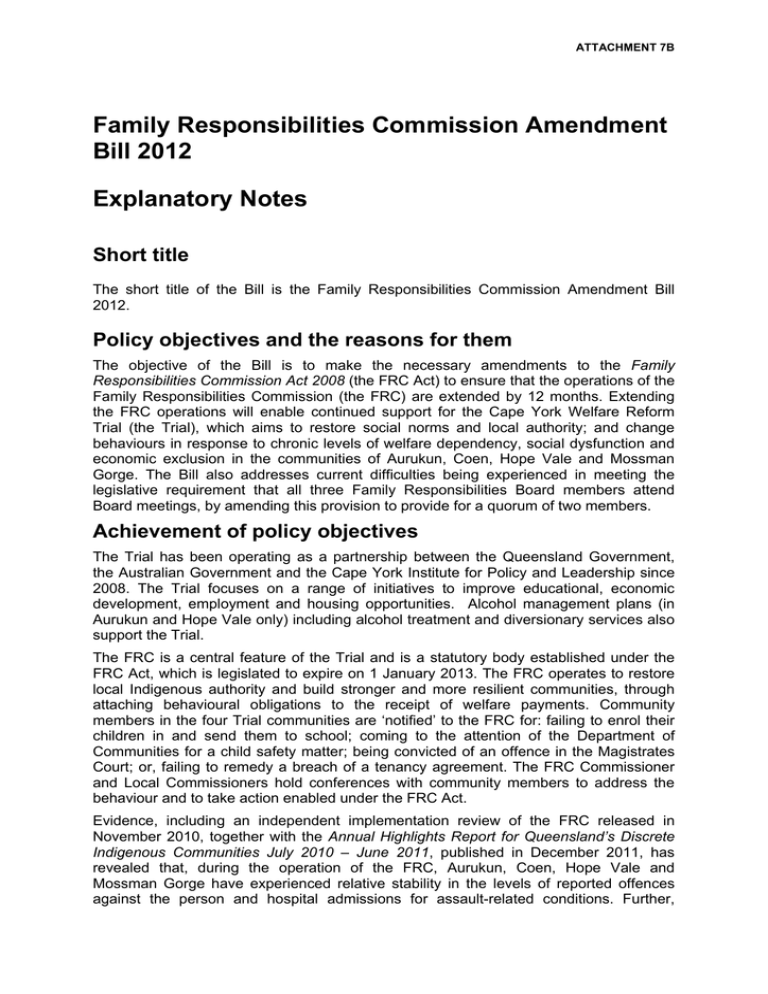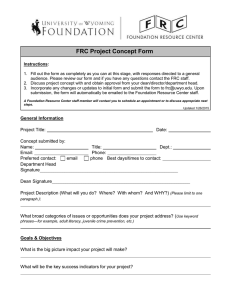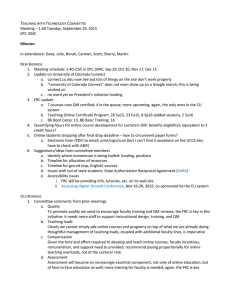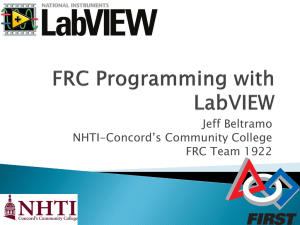Template Explanatory Notes for Bills
advertisement

ATTACHMENT 7B Family Responsibilities Commission Amendment Bill 2012 Explanatory Notes Short title The short title of the Bill is the Family Responsibilities Commission Amendment Bill 2012. Policy objectives and the reasons for them The objective of the Bill is to make the necessary amendments to the Family Responsibilities Commission Act 2008 (the FRC Act) to ensure that the operations of the Family Responsibilities Commission (the FRC) are extended by 12 months. Extending the FRC operations will enable continued support for the Cape York Welfare Reform Trial (the Trial), which aims to restore social norms and local authority; and change behaviours in response to chronic levels of welfare dependency, social dysfunction and economic exclusion in the communities of Aurukun, Coen, Hope Vale and Mossman Gorge. The Bill also addresses current difficulties being experienced in meeting the legislative requirement that all three Family Responsibilities Board members attend Board meetings, by amending this provision to provide for a quorum of two members. Achievement of policy objectives The Trial has been operating as a partnership between the Queensland Government, the Australian Government and the Cape York Institute for Policy and Leadership since 2008. The Trial focuses on a range of initiatives to improve educational, economic development, employment and housing opportunities. Alcohol management plans (in Aurukun and Hope Vale only) including alcohol treatment and diversionary services also support the Trial. The FRC is a central feature of the Trial and is a statutory body established under the FRC Act, which is legislated to expire on 1 January 2013. The FRC operates to restore local Indigenous authority and build stronger and more resilient communities, through attaching behavioural obligations to the receipt of welfare payments. Community members in the four Trial communities are ‘notified’ to the FRC for: failing to enrol their children in and send them to school; coming to the attention of the Department of Communities for a child safety matter; being convicted of an offence in the Magistrates Court; or, failing to remedy a breach of a tenancy agreement. The FRC Commissioner and Local Commissioners hold conferences with community members to address the behaviour and to take action enabled under the FRC Act. Evidence, including an independent implementation review of the FRC released in November 2010, together with the Annual Highlights Report for Queensland’s Discrete Indigenous Communities July 2010 – June 2011, published in December 2011, has revealed that, during the operation of the FRC, Aurukun, Coen, Hope Vale and Mossman Gorge have experienced relative stability in the levels of reported offences against the person and hospital admissions for assault-related conditions. Further, ATTACHMENT 7B school attendance in the Trial communities has improved or been maintained at higher levels. The extension of the FRC until 31 December 2013 will allow further opportunity to consolidate the gains the Trial has made in terms of the safety, wellbeing and welfare of the people in the Trial communities, particularly for women and children. The extension will also provide time for the results of an independent evaluation of the Trial to be considered in determining future welfare reform initiatives. The provisions within the FRC Act that impact on the expiration of the Act, the vacation of FRC Commissioners and Board members’ offices, and the ending of family responsibilities agreements or orders require amendment in order to reflect the extension of the Trial and the continued operation of the FRC until 31 December 2013. It is reasonable and appropriate that these amendments to the FRC Act be made as they are essential to enabling the continued operation of a central component of the Trial until 31 December 2013. Alternative ways of achieving policy objectives There are no other viable alternatives to amending the FRC Act that will achieve the policy objective of extending the operations of the FRC for a further 12 months and enabling the range of welfare reform initiatives provided under the Trial. Estimated cost for government implementation To date, the direct financial contribution to the Trial from the State and Australian Governments totals approximately $90 million. The known total Australian Government contribution to date is $48 million, while the Queensland Government has committed $41.9 million in direct costs. The State has allocated costs sufficient to extend the Trial for a further 12 months, after making efficiencies in staffing, program management and program costs. The Queensland Government’s contribution includes $1.6 million towards the operations of the FRC. The Australian Government has confirmed that it will cover the balance of the costs involved in extending the operation of the FRC for an additional 12 months. Consistency with fundamental legislative principles The Bill is considered to be consistent with the fundamental legislative principles (FLPs) set out in the Legislative Standards Act 1992 (Qld). However, any potential breaches of FLPs are addressed below. The primary FLP issue involving the FRC extension, in terms of whether the proposed legislation has sufficient regard for the rights and liberties of individuals in accordance with section 4 of the Legislative Standards Act 1992 (Qld), relates to the potential infringement of the Racial Discrimination Act 1975 (Cth). In order for the Trial and FRC to operate effectively, behavioural obligations of community members were attached to the receipt of welfare payments in the four Trial communities. For this provision to be legal there is a requirement to meet the conditions of a ‘special measure’ under the Commonwealth Government’s Racial Discrimination Act 1975. ATTACHMENT 7B The 12-month extension of the Trial and FRC to December 2013 is likely to be considered a ‘special measure’ under section 8(1) of the Racial Discrimination Act 1975 (Cth) and, therefore, it is unlikely it would breach that Act. However, a ‘special measure’ is temporary and cannot continue once the objectives of the Trial are met. To maintain ‘special measure’ status, community and stakeholder consultation, as extensive as the previous two consultation processes, was needed with all communities subject to the Act prior to government deciding to extend the Trial. The Anti-discrimination Act 1991 (Qld) will not impact on a 12-month extension and that there is no conflict with section 4(2) of the Legislative Standards Act 1992 (Qld) which requires legislation have sufficient regard to the rights and liberties of individuals with respect to a contravention of the Racial Discrimination Act. The proposed amendment of section 156 (When particular agreements or family responsibilities orders end) to change references from “1 January 2013” to “1 January 2014”, also raises an FLP issue. Agreements, orders and related obligations due to expire on 1 January 2013, will now be preserved for the life of the agreement or order, or until new section 156 expiry date, 1 January 2014 (depending on whichever is the earliest). However, there is nothing in the Act that prevents the making of agreements or orders that extend beyond the Trial end date if the FRC believes that these achieve the objects and purposes of the Act. The preservation of particular agreements and orders that would have ended on 1 January 2013, if not for the section 156 amendment, is consistent with and will also contribute to the continued achievement of the objects of the Act and therefore, this amendment has sufficient regard for the rights and liberties of people in the Trial communities. Consultation In 2012, consultation with Trial stakeholders was conducted to assist the government in determining whether or not to extend the Trial for one calendar year, from December 2012 to December 2013. The 2012 consultation involved engagement with the same level and range of stakeholders as in 2011, including the Trial partners, State and regional agencies, Councils, service providers, unions, and community groups. Consultation was undertaken with original stakeholders that were consulted during the development of the Family Responsibilities Commission Act in early 2008. Additional stakeholders consulted included the service providers in the Trial communities, the FRC Commissioners and staff and Cape York regional organisations. Key stakeholders consulted include Mayors and community leaders, Community Justice Groups (CJGs), and community members, service providers, relevant Queensland and Australian Government agencies, FRC Commissioners and staff, the Commission for Children and Young People and Child Guardian and relevant unions. Key outcomes Of the people consulted, there was a commonly held view that the Trial has a positive effect on the behaviour of community members, with community members seeing ATTACHMENT 7B more children going to school and communities being “quieter” than before the Trial commenced. The Trial has been regarded by many as a key driver for improved school attendance and school readiness in the communities and that focus on consistent school attendance and valuing education needs to continue. The value of the measures aimed at schooling and education, including Student Education Trusts and Student Case Managers were widely known and generally accepted and supported by the communities. Most stakeholders consulted commented that people knew how the FRC could assist in addressing their problems and some were actively seeking Trial-related support outside of the formal FRC process. However, in some cases respondents felt that the FRC model was problematic, in that it did not involve community leaders as much as it should in designing and delivering solutions and may be creating dependency among those who had come to rely on its services. It was perceived by stakeholders that the Trial had created new avenues including the FRC, the local program offices, Wellbeing Centres, and Village Opportunity Hubs for people to seek assistance. Consultation results in Aurukun, Coen and Mossman Gorge were consistent with the results of consultation in 2011 and supported an extension of the Trial. Hope Vale community consultations suggested that the community was more supportive of the Trial than in 2011. Many of the community members consulted referred to benefits of Trial Services such Wellbeing Centres, Opportunity Hubs, Parenting Programs, Basics Cards, MPower, Family Income Management, and Student Education Trusts. Aurukun, Coen and Mossman Gorge Stakeholders were extremely supportive of the Trial and the services provided as a result of the Trial. In Aurukun, positive examples were provided of how the Trial had improved conditions in the community of Aurukun and there was no outstanding criticism of the FRC or of welfare reform. In Coen, there was concern expressed that if the Trial and the FRC were to be discontinued, another mechanism would be required to manage the school attendance and compliance matters which were considered to be effective. In Mossman Gorge, stakeholders stated that the FRC had resulted in positive changes in the community in terms of local leadership, good behaviour, positive relationships with Police and encouragement for the community to take responsibility for their people. Hope Vale Community members and service providers were supportive of the Trial and noted improvements, including less unrest in the community, a decrease in Child Safety notifications and a monthly integrated case management approach as benefits of the Trial. There were concerns that, if the Trial were to come to an end, there would be a ATTACHMENT 7B big impact on school attendance and that there would be a need to continue the services that had been provided as part of the Trial. Consultation with the Council presented the only strong dissenting view regarding the continuation of the Trial and the FRC. However, the Council also that mentioned that the Wellbeing Centre was having a positive impact and that Income Management was assisting some people. Consultations with other Stakeholders Stakeholders, including representatives of Queensland Government Agencies, the Australian Government, Government Champions and their support officers, unions and educational bodies were generally supportive of an extension of the Trial.”. However, there were comments that the results of the independent evaluation would be important in determining future initiatives which would need to be cost-effective, sustainable and not resulting in disruption to communities. Consistency with legislation of other jurisdictions The proposal to extend the FRC Act is consistent with the income management regime under Part 3B of the Social Security (Administration) Act 1999 (Cth) (the Social Security Administration Act). Section 123UF of the Social Security Administration Act makes specific provision for the FRC to give the Secretary of the Australian Government’s Department of Families, Housing, Community Services, and Indigenous Affairs notices requiring that persons be subject to income management. ATTACHMENT 7B Notes on provisions Part 1 Preliminary Clause 1 is the ‘Short title’ and notes that the Act is to be cited as the Family Responsibilities Commission Amendment Act 2012. Schedule 1 Clause 2 notes that this Act amends the Family Responsibilities Act 2008. Clause 3 amends section 123 (Board meetings). Subsection 123(3) currently states that all board members must be present at a board meeting. To address the practical issues arising when a member is not available to attend a board meeting, Subsection 123(3) will be amended to become ‘At a meeting of the board, a quorum is at least 2 members’. Clause 4 amends section 152 (Expiry of Act) by changing 1 January 2013 to 1 January 2014 to allow for the continued operation of the FRC for a further 12 months. Clause 5 amends section 155 (Vacation of office on expiry of the Act). Subsection 155(1) currently states that section 155 applies to a FRC commission member or board member holding office immediately before 1 January 2013. To reflect the extension of the expiry date of the FRC this will be amended to 1 January 2014. Subsection 155(2) currently states that a member’s office is taken to have been vacated on 1 January 2013. To reflect the extension of the expiry date of the FRC this will be amended to 1 January 2014. Clause 6 amends section 156 (When particular agreements or family responsibilities orders end). Subsections 156(1) and 156(2) state that family responsibilities agreements, including agreements about income management, and family responsibilities orders that are in force immediately before 1 January 2013 end on 1 January 2013. To reflect the extension of the expiry date of the FRC the references to 1 January 2013 in subsections 156(1) and 156(2) will be amended to 1 January 2014.


